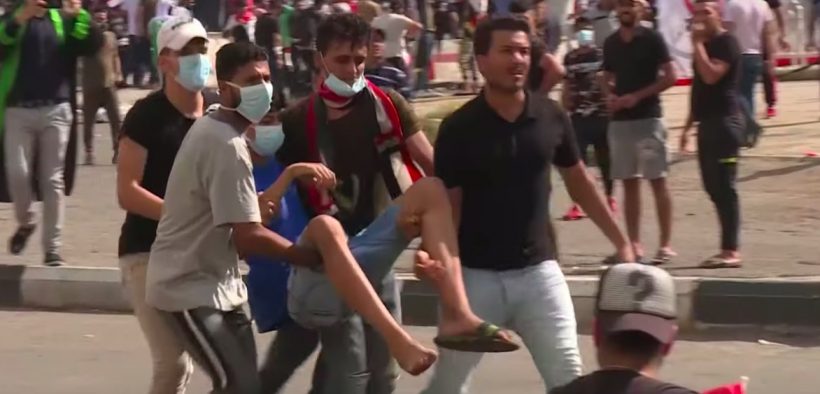Sixteen Iraqi Protesters Killed and Dozens Others Injured In Southern Iraq

Protests in Iraq continue to escalate as protesters call for government resignations on charges of corruption, poor public services, and pervasive Iranian influence in Iraqi affairs.
At least sixteen Iraqi demonstrators were reportedly killed on Thursday and dozens of others were wounded after Iraqi security forces used force to disperse crowds of protesters in the southern Iraqi province of Nasiriya.
Medical sources in Nasiriya were reported as saying that at least 120 other protesters were wounded, including many in critical condition.
Since Wednesday night, hundreds of protesters took to the streets to demonstrate. The protests came a few hours after other Iraqi protesters in the religious city of Najaf reportedly set fire to the Iranian consulate amidst popular discontent for what Iraqis describe Iranian intervention in Iraqi affairs.
“We had blocked off the roads and bridges over the past four days and security forces moved in on us to try to open up the bridges. They opened fire leading to a bloodbath,” Hussein, a 32-year-old local lawyer in the Nasiriya province, told Al Jazeera.
Iraqi authorities had earlier beefed up their military presence in the Nasiriya province as part of the government’s crackdown on protests that began on early October.
Al Jazeera reported that the governor of Dhi-qar, Adel Aldukhaily, called on the Iraqi Shiite Prime Minister, Adel Abdulhadi, to withdraw the extra forces, dispatched to Nasiriya. He described the crackdown as an ‘unacceptable’ use of force.
The use of force by Iraqi forces came amidst a state of curfew, declared across the Nasiriya province, earlier on Thursday morning.
Attack on Iranian Consulate
On Wednesday, hundreds of Iraqis set tires to fire near the Iranian consulate in the Najaf Shiite-majority city, forcing the consulate’s staff to evacuate. Sky News Arabia reported that flames hit the consulate’s building.
In the meantime, the Shiite-dominated Popular Mobilization Forces, known as the Alhashd Alsha’bi, warned against what they termed deliberate vandalism by some Iraqi factions.
Leader of the Alhashd Alsha’bi, Abu Mahdi Almuhandis, was quoted as saying in a statement: “We will cut off their hands.”
The Iranian Foreign Ministry condemned the attack on the Iranian consulate, the second in a month, after other Iraqi protesters set fire to the Iranian consulate in Karbala city in early November.
Background
In early October, many thousands of Iraqis took to the streets of the capital Baghdad and other Iraqi cities in protest of the one-year-old government of Abel Abdulhadi, which the Iraqis blame for failing to make needed economic reforms.
Government-led security forces fiercely responded to protests, killing around 150 and wounding more than 1,000 others. In response, Prime Minister Abdulhadi pledged some reforms including reducing salaries of high-ranking officials and supporting low-income Iraqi households.
Later in October, protesters returned back to streets after none of the promised reforms were implemented.
Since the 2003 American military invasion of Iraq fell the the regime of former Iraqi President Saddam Hussein, who belonged to the Suni Muslim sect, Iran has restored relations with the neighboring country, where there are some major Shiite-linked Islamic shrines and some key Shiite scholars.
Both Shiite Iran and the Shiite-populated Iraq engaged in an eight-year war in the 1980s under the regime of late Sunni-Muslim Iraqi President Saddam Hussein.







